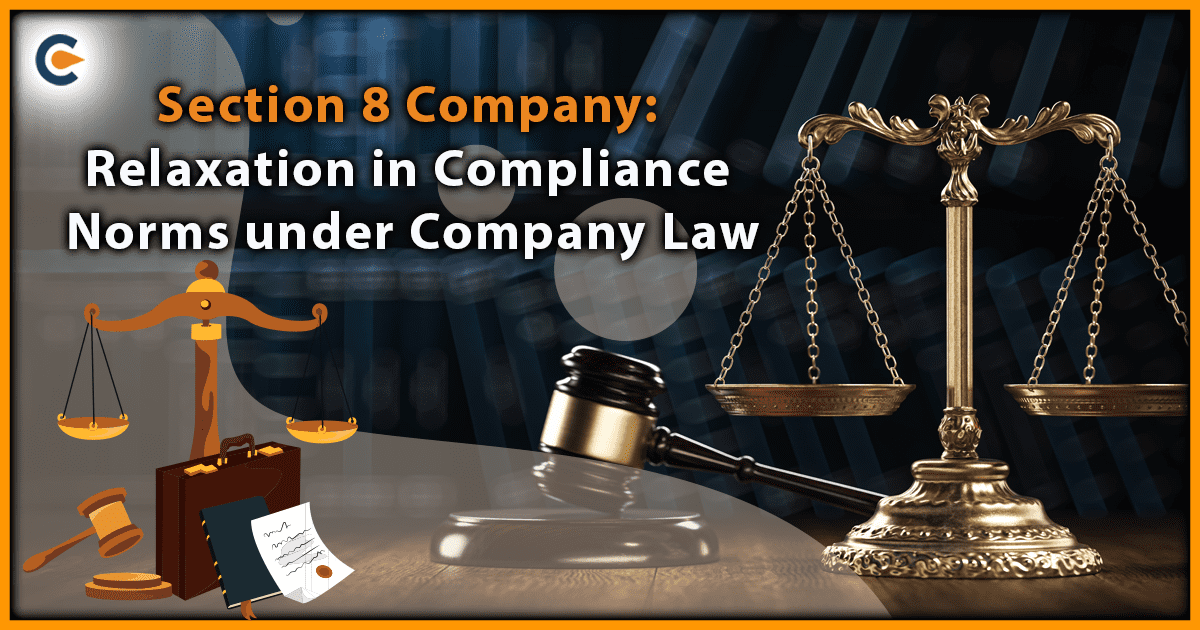Section 8 companies, as defined by the Companies Act 2013 in India, are non-profit organizations that operate to promote social welfare and public good. Unlike profit-oriented companies, Section 8 companies prioritize utilizing their income and resources for the betterment of society rather than distributing profits to their members. Several key features and benefits are associated with forming a Section 8 company.
Firstly, these companies operate on a non-profit basis, meaning that their primary objective is to engage in social welfare activities rather than generating profits. This focus allows them to make a significant impact on various social issues. Additionally, members of Section 8 companies enjoy limited liability, ensuring their assets are protected in the face of financial obligations or legal liabilities.
Section 8 companies are also eligible for tax exemptions, including income tax, stamp duty, and capital gains tax exemptions, subject to certain conditions and approvals. This financial benefit allows these organizations to allocate more resources towards their social objectives.
Another advantage of Section 8 companies is that they do not have a minimum capital requirement, making it easier for organizations with limited funds to establish themselves and pursue their social goals. Furthermore, these companies enjoy greater social credibility and recognition due to their commitment to social welfare activities. This reputation can attract donations, collaborate with other organizations, and foster stakeholder trust.
The primary benefit of forming a Section 8 company is the opportunity to actively contribute to social welfare and positively impact society. These companies are vital in addressing social issues and uplifting marginalized communities by prioritizing social objectives.
Compliance Norms under Company Law
Compliance requirements under company law encompass a set of rules and regulations that companies must adhere to to ensure transparency, accountability, and legal adherence in their operations. These norms are put in place to govern various aspects of a company’s functioning, including its formation, management, financial reporting, corporate governance, and interactions with stakeholders. Failure to comply with these requirements can result in legal consequences, penalties, reputational damage, and loss of investor confidence.
Companies are required to comply with a range of obligations, which may include:
1. Registration and incorporation: Companies must fulfill the necessary procedures and requirements for registering and incorporating their entity under the applicable company law. This involves submitting the required documents, paying the prescribed fees, and obtaining the necessary approvals.
2. Annual compliance: Companies are obligated to conduct and report annual general meetings (AGMs[1]), prepare financial statements, and file annual returns within the stipulated timeframes. These requirements ensure transparency and give stakeholders insights into the company’s financial performance and operations.
3. Corporate governance: Compliance with corporate governance norms is essential to ensure ethical conduct, proper decision-making processes, and protection of stakeholders’ interests. Companies are expected to have an entire board of directors, establish board committees, maintain accurate records, and disclose relevant information to shareholders.
4. Statutory record keeping: Companies must maintain various statutory registers, such as the register of members, register of directors, and register of charges. These registers serve as vital records for regulatory compliance and transparency.
5. Tax compliance: Companies must fulfil their tax obligations, including timely payment of taxes, filing tax returns, and adhering to tax-related reporting and disclosure requirements.
6. Disclosures and transparency: Companies must make accurate and timely disclosures of material information to shareholders, regulatory authorities, and the public. This includes financial statements, auditor reports, related-party transactions, and any other relevant information that may impact stakeholders’ decision-making.
Importance of Complying with Statutory Obligations
Complying with statutory obligations is of paramount importance for companies due to the following reasons:
1. Legal compliance: Failure to comply with statutory obligations can result in legal consequences, such as fines, penalties, or legal actions. Non-compliance can lead to reputational damage and loss of trust among stakeholders.
2. Investor confidence: Complying with statutory obligations enhances investor confidence. Investors are likelier to trust and invest in companies that demonstrate a commitment to compliance, as it signals good governance, transparency, and responsible management practices.
3. Stakeholder protection: Compliance norms are designed to protect stakeholders’ interests, including shareholders, employees, creditors, and customers. Complying with these obligations ensures that stakeholders’ rights and interests are safeguarded.
4. Business sustainability: Compliance with statutory obligations contributes to the long-term sustainability of a business. It helps create a stable and predictable regulatory environment, reducing risks and ensuring the company’s continued operations.
5. Ethical and responsible conduct: Compliance with statutory obligations reflects the company’s commitment to ethical and responsible business practices. It demonstrates the company’s integrity, respect for the law, and societal accountability.
6. Access to opportunities: Compliance with statutory obligations is often a prerequisite for accessing various opportunities, such as government contracts, funding, partnerships, and collaborations. Non-compliant companies may be excluded from such opportunities, limiting their growth and development.
Compliance with statutory obligations is essential for companies to operate within the legal framework, maintain stakeholder trust, and achieve sustainable growth. It ensures transparency, accountability, and responsible conduct while protecting stakeholders’ interests and maintaining a favorable business environment.
Relaxation of Compliance Norms for Section 8 Companies
In recognition of the unique nature and social objectives of Section 8 companies, specific relaxation provisions have been introduced to ease the compliance burden on these entities. These relaxations aim to facilitate the smooth operation and fulfillment of their social welfare objectives. The relaxation provisions for Section 8 companies include:
1. Exemptions in name approval: Section 8 companies have been granted exemptions from certain name approval restrictions that apply to other types of companies. This allows Section 8 companies more flexibility in choosing names that reflect their social welfare objectives.
2. Simplified object clause: Section 8 companies have a simplified object clause in their Memorandum of Association (MOA). They are not required to include the specific commercial objects related to profit generation. Instead, their object clause focuses on promoting social welfare, charity, education, or any other useful public purpose.
3. Reduced minimum membership requirement: Section 8 companies enjoy a reduced minimum membership requirement compared to other types of companies. While other companies typically require at least two members, Section 8 companies can be formed with just one member.
4. Relaxed capital maintenance rules: Section 8 companies have a relaxation in maintaining a minimum capital level. This flexibility allows these organizations to operate even with minimal funds and direct their resources towards achieving their social objectives.
Section 8 companies, which are primarily focused on promoting social welfare or charitable activities, have different compliance norms compared to other types of companies. One key distinction lies in their objectives. While Section 8 companies prioritize social impact, other companies are oriented towards profit generation and maximizing shareholder value.
Additionally, profit distribution practices vary between Section 8 companies and other types of companies. Section 8 companies are not permitted to distribute profits or dividends among their members. In contrast, other companies can distribute profits to their shareholders in accordance with the provisions of company law.
Compliance requirements also diverge between Section 8 companies and other companies. Section 8 companies are provided with specific relaxation provisions to alleviate their compliance burden, recognizing their focus on social welfare rather than profit. On the other hand, other companies must comply with more stringent regulations and reporting requirements due to their profit-oriented nature.
Reduction in Regulatory Burden
The relaxation in compliance norms for Section 8 companies significantly reduces their regulatory burden, allowing them to focus more on their social welfare objectives. This reduction in regulatory burden is evident in the following ways:
1. Simplified procedures: Section 8 companies benefit from simplified procedures in various aspects of compliance, such as name approval and object clause. These streamlined processes save time, effort, and resources, minimizing administrative burdens.
2. Flexibility in governance: The relaxed compliance norms provide flexibility in the governance structure of Section 8 companies. They have more freedom to determine their organizational structure, allowing for efficient decision-making and faster implementation of social welfare activities.
3. Less stringent financial requirements: Section 8 companies have relaxed financial requirements unlike other companies. They are not bound by a minimum capital requirement, enabling them to commence operations with limited funds and allocate resources directly towards social welfare initiatives.
Advantages of Reduced Compliance Requirements for Promoting Social Welfare Activities:
The advantages of reduced compliance requirements for Section 8 companies are evident in their ability to promote and enhance social welfare activities:
1. Resource optimization: With reduced compliance burdens, Section 8 companies can allocate a larger portion of their resources directly towards social welfare activities. This ensures that a more significant percentage of funds is utilized for the benefit of the targeted beneficiaries, maximizing the impact of their initiatives.
2. Operational efficiency: Section 8 companies can efficiently minimise regulatory burdens. They can focus on planning and executing social welfare projects without being burdened by extensive compliance requirements, enabling them to make a tangible difference in a shorter period.
3. Increased innovation and adaptability: Reduced compliance requirements encourage Section 8 Company to be innovative and adaptable in addressing social issues. With fewer bureaucratic hurdles, these organizations can explore new approaches, experiment with different solutions, and respond swiftly to emerging challenges in the social sector.
4. Attraction of talent and partnerships: The reduced regulatory burden makes Section 8 companies more appealing to talented individuals and potential partners. Professionals passionate about social welfare are more likely to join these organizations knowing that the focus on making a positive impact rather than generating profit.
This reduction enables resource optimization, enhances operational efficiency, fosters innovation and adaptability, and attracts talent and partnerships. By creating a conducive environment for Section 8 companies, the reduced compliance requirements contribute to the effective pursuit of their social welfare objectives and overall societal betterment.
Impact on Social Sector Organizations
The introduction of relaxed compliance norms for Section 8 companies has significantly impacted social sector organizations and non-profit entities. These relaxed norms provide opportunities and benefits for organizations working in education, healthcare, and the environment. The impact can be seen in the following ways:
1. Ease of formation: The reduced minimum membership requirement and simplified object clause make it easier for social sector organizations to form Section 8 Company. This facilitates the establishment of non-profit entities, allowing them to focus on their social objectives without unnecessary bureaucratic hurdles.
2. Operational flexibility: Relaxing compliance norms gives social sector organizations more operational flexibility. They can allocate resources towards their social welfare activities without the burden of maintaining a minimum capital level. This flexibility allows organizations to utilize their funds to benefit the targeted beneficiaries efficiently.
3. Access to funding: Section 8 companies, with their non-profit nature and focus on social welfare, often find it easier to access funding from various sources. Government agencies, corporate social responsibility initiatives, philanthropic organizations, and individual donors are more inclined to support social sector organizations due to the tax exemptions and recognition associated with Section 8 companies. The relaxed compliance norms enhance the credibility of these organizations, making them attractive to potential funders.
4. Enhanced collaboration opportunities: The reputation and recognition enjoyed by Section 8 companies enable them to collaborate with other organizations, institutions, and government bodies. These collaborations can result in increased impact and reach of social sector organizations and facilitate knowledge sharing and resource pooling.
5. Trust and credibility: The relaxed compliance norms for Section 8 Company contributes to building trust and credibility in the social sector. Stakeholders, including beneficiaries, donors, and partners, perceive Section 8 companies as organizations committed to social welfare. This trust can lead to stronger partnerships, increased support, and a broader network of stakeholders.
6. Long-term sustainability: By easing the compliance burden, social sector organizations can focus on the sustainability of their operations. They can allocate more resources towards program implementation, capacity building, and impact assessment. This emphasis on sustainability enhances the effectiveness and longevity of their social welfare initiatives.
7. Regulatory support: The relaxed compliance norms for Section 8 companies indicate regulatory support for organizations working in the social sector. This recognition fosters a positive environment for the growth and development of social sector organizations, encouraging more entities to contribute to social welfare.
In conclusion, the relaxed compliance norms for Section 8 Company has transformed social sector organizations and non-profit entities. These organizations benefit from easier formation processes, operational flexibility, increased access to funding, collaboration opportunities, enhanced trust, and long-term sustainability. The relaxed norms facilitate the growth and effectiveness of organizations working towards social welfare in education, healthcare, the environment, and beyond.
Conclusion
The relaxation of compliance norms for Section 8 companies is paramount in promoting their social welfare objectives and facilitating their operations. These companies are vital in addressing social issues and promoting public welfare. The relaxation provisions acknowledge their unique non-profit nature and enable them to allocate resources efficiently towards their intended social welfare activities. By easing the compliance burden, the government demonstrates its commitment to creating a conducive environment for these organizations, emphasizing the significance of their contribution to society. Overall, the relaxation of compliance norms enhances the growth, sustainability, and effectiveness of Section 8 companies in promoting social welfare and ease of doing business.
Read our Article: What Are The Relaxations Given To Section 8 Companies Under Company Law?











